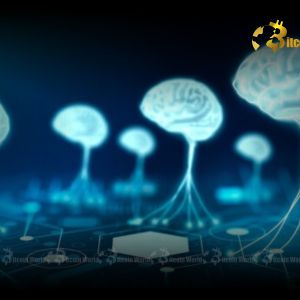Meta AI’s Pivotal Talent Grab: Two More OpenAI Researchers Join the Superintelligence Lab
7 min read
BitcoinWorld Meta AI’s Pivotal Talent Grab: Two More OpenAI Researchers Join the Superintelligence Lab In the rapidly evolving landscape of artificial intelligence, where breakthroughs can reshape industries overnight, the strategic acquisition of top talent is paramount. For those deeply invested in the cryptocurrency space, understanding these shifts in AI development is crucial, as AI’s advancements increasingly intersect with blockchain technology, from optimizing network security to powering decentralized applications. The latest news from Meta, involving its new Superintelligence Lab, underscores this intense competition for the brightest minds, signaling a significant acceleration in the race towards Artificial General Intelligence (AGI). This move by Meta AI is not just about hiring; it’s a bold declaration of intent in the high-stakes battle for AI supremacy. Meta AI’s Ambitious Vision: A Race to Superintelligence Meta Platforms, under the leadership of CEO Mark Zuckerberg, has been making increasingly aggressive moves in the artificial intelligence domain. While often known for its social media platforms, Meta has quietly, yet powerfully, positioned itself as a significant player in AI research. Its commitment is evident in the establishment of the Superintelligence Lab , a dedicated division aimed at pushing the boundaries of AI far beyond current capabilities. This isn’t merely about incremental improvements; it’s about achieving AGI, a level of AI where machines can understand, learn, and apply intelligence across a wide range of tasks, much like a human. Meta’s approach has often been characterized by its open-source philosophy, particularly with its Llama series of large language models. This strategy contrasts sharply with some competitors who prefer more closed, proprietary systems. However, the pursuit of AGI demands an unparalleled concentration of talent and resources, irrespective of the open-source stance. Zuckerberg’s vision for AGI is not just about building smarter tools; it’s about creating foundational technologies that could underpin future digital ecosystems, including potentially decentralized ones that resonate with the crypto community’s ethos. The Strategic Significance of Acquiring Top OpenAI Researchers The recent reports, citing sources familiar with the matter, indicate that Meta has successfully lured two more high-profile OpenAI researchers : Jason Wei and Hyung Won Chung. Both individuals reportedly had their internal OpenAI Slack profiles deactivated, a strong indicator of their departure. This acquisition is particularly noteworthy given OpenAI’s prominent position at the forefront of generative AI, having popularized models like ChatGPT. Let’s delve into why these specific individuals are such valuable assets: Jason Wei: His primary focus at OpenAI was on ‘o3’ and deep research models, which are critical for developing more sophisticated and robust AI systems. Before his tenure at OpenAI, Wei made significant contributions to chain-of-thought research at Google. Chain-of-thought prompting is a technique that enables large language models to tackle complex reasoning tasks by breaking them down into intermediate steps, mimicking human thought processes. This expertise is invaluable for Meta’s AGI ambitions, as it directly contributes to building AI systems capable of more complex problem-solving and reasoning. Hyung Won Chung: Chung, who previously overlapped with Wei at Google, worked on deep research and OpenAI’s ‘o1’ model. His research is specifically centered on reasoning and agents. The development of intelligent agents that can interact with their environment, make decisions, and learn autonomously is a cornerstone of achieving AGI. Chung’s work in this area would directly bolster Meta’s efforts to create more autonomous and capable AI systems. Sources suggest a close working relationship between Wei and Chung, which likely played a role in Meta’s decision to bring them on board together. This strategy, akin to how certain groups of experts were brought together during historical periods of intense innovation, allows for immediate synergy and continuity in complex research areas. It’s a testament to Meta’s aggressive recruitment tactics, aimed at consolidating the best AI talent available globally. The High-Stakes Race to AGI and the Global AI Talent War The pursuit of AGI is not merely a scientific endeavor; it’s a global technological arms race. Companies like Meta, Google, Microsoft (through its investment in OpenAI), and Anthropic are pouring billions into research and development, understanding that whoever achieves AGI first could gain an insurmountable competitive advantage across virtually every industry. AGI promises to unlock unprecedented capabilities, from revolutionary scientific discoveries to highly personalized digital experiences, and even entirely new economic models. This intense competition has fueled an unprecedented AI talent war. Top AI researchers, engineers, and data scientists are among the most sought-after professionals in the world, commanding astounding compensation packages that include multi-million dollar salaries, significant equity, and unparalleled research freedom. The demand far outstrips the supply, leading to a fierce battle for every skilled individual. Companies are not just competing on salary; they are also offering cutting-edge infrastructure, collaborative environments, and the promise of working on truly groundbreaking projects that could define the future of humanity. The poaching of talent from one leading AI lab to another is a common symptom of this intense rivalry. It highlights the strategic importance of human capital in this field. Every new hire, especially those with a proven track record of innovation and deep research, can significantly alter a company’s trajectory and accelerate its progress towards AGI. This dynamic underscores the critical role of individual brilliance and collaborative genius in shaping the future of AI. Strategic Talent Acquisition: Meta’s Playbook in Action Meta’s strategy in acquiring Jason Wei and Hyung Won Chung is a clear example of its aggressive playbook. Recognizing the value of established working relationships, Meta seems to be targeting not just individual brilliance but also synergistic pairings. This approach can yield immediate benefits, as teams that have successfully collaborated in the past can often hit the ground running with minimal friction. It also suggests a sophisticated understanding of how to build effective research units within the Superintelligence Lab. This talent acquisition strategy aligns with Meta’s broader push to enhance its AI capabilities across all its products and services. From improving recommendation algorithms on Instagram and Facebook to developing more realistic avatars for the metaverse and, critically, building the foundational models for AGI, Meta needs a constant influx of top-tier expertise. The addition of researchers with deep experience in models, reasoning, and agents directly feeds into these ambitious goals. The implications of such high-profile moves extend beyond the immediate gains for Meta. They also signal shifts in the broader AI ecosystem. As talent moves, so too does knowledge and expertise, potentially influencing the direction of research and development across different organizations. This fluidity of talent can foster innovation but also raise questions about intellectual property and competitive practices within the industry. Impact and Future Implications for AI Development The integration of researchers like Wei and Chung into Meta’s Superintelligence Lab could have profound implications for the company’s AI roadmap. Their expertise in deep research models, chain-of-thought reasoning, and agent development will undoubtedly accelerate Meta’s progress towards AGI. This could lead to: More Capable AI Models: Expect Meta to release increasingly sophisticated AI models, potentially rivaling or even surpassing those from competitors in specific domains. Enhanced Reasoning Abilities: With a focus on reasoning and agents, Meta’s AI systems could become much better at understanding context, making logical deductions, and performing complex multi-step tasks. Faster AGI Progress: Every top-tier hire brings Meta closer to its ultimate goal of achieving AGI, which could redefine what’s possible with AI technology. Influence on Open-Source AI: Given Meta’s history, it will be interesting to see if these new advancements eventually trickle down into more powerful open-source models, benefiting the wider developer community, including those building on blockchain. For the cryptocurrency world, the acceleration of AGI development holds immense potential. More advanced AI could lead to breakthroughs in decentralized autonomous organizations (DAOs), smart contract auditing, predictive analytics for market trends, and even new forms of AI-driven digital assets. The ethical considerations surrounding AGI, such as control, bias, and alignment, will also become increasingly relevant to decentralized governance models. Navigating the Evolving AI Landscape The story of Meta securing these OpenAI researchers is a microcosm of the larger, dynamic AI landscape. It highlights several key takeaways: Talent is King: In the AI arms race, human capital is arguably the most critical resource. Companies are willing to invest heavily to attract and retain the best minds. Intense Competition: The rivalry among tech giants for AI supremacy is fierce, manifesting in aggressive recruitment and rapid innovation cycles. Strategic Vision: Meta’s focus on AGI and its dedicated Superintelligence Lab demonstrate a long-term, ambitious vision for the future of AI. Interconnected Ecosystem: The movement of talent between leading labs underscores the interconnectedness of the AI research community, even amidst competition. As AI continues its rapid evolution, driven by such strategic talent acquisitions, the implications for technology, economy, and society will be profound. The continuous flow of knowledge and expertise across organizations, while competitive, ultimately pushes the boundaries of what AI can achieve. Conclusion Meta’s reported acquisition of two more high-profile OpenAI researchers , Jason Wei and Hyung Won Chung, is a significant development in the ongoing race for AI dominance. Their expertise in deep research models, reasoning, and agents will undoubtedly bolster Meta’s Superintelligence Lab and accelerate its pursuit of AGI . This strategic talent grab underscores the fierce competition for top AI talent and highlights Meta’s unwavering commitment to leading the next wave of artificial intelligence innovation. As these brilliant minds converge under Meta AI’s banner, the world watches with anticipation to see how their contributions will shape the future of AI, potentially unlocking capabilities that were once confined to the realm of science fiction. To learn more about the latest AI market trends, explore our article on key developments shaping AI models’ features and institutional adoption. This post Meta AI’s Pivotal Talent Grab: Two More OpenAI Researchers Join the Superintelligence Lab first appeared on BitcoinWorld and is written by Editorial Team

Source: Bitcoin World



